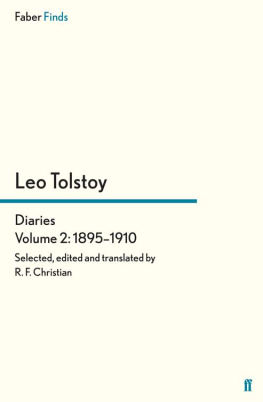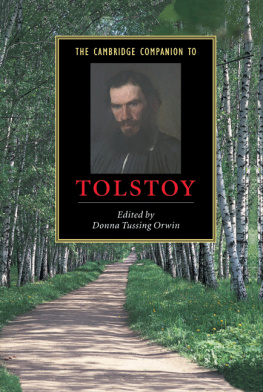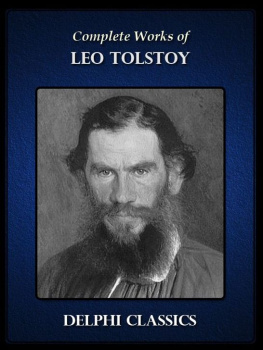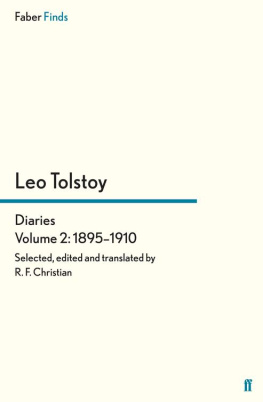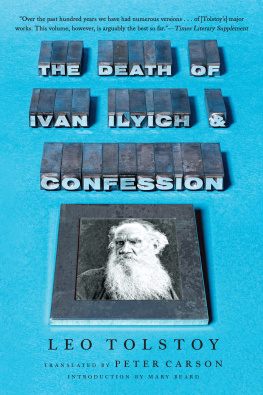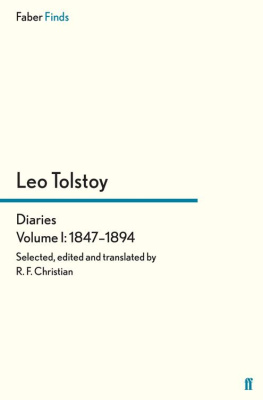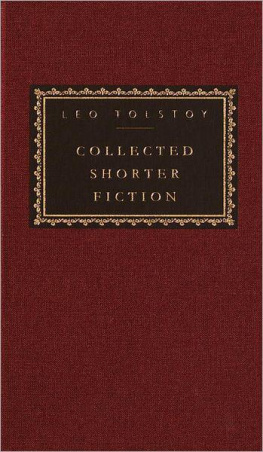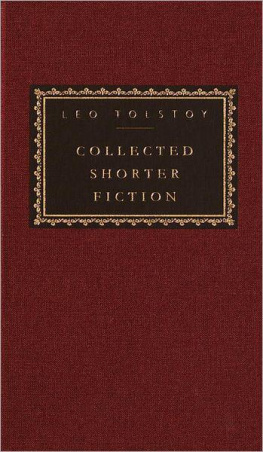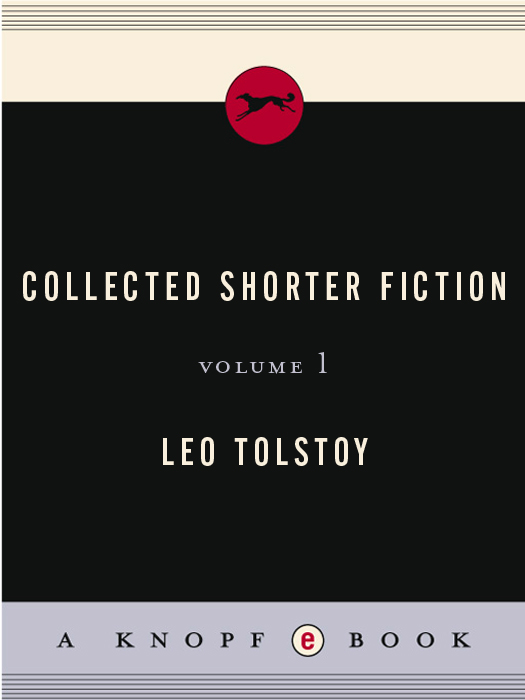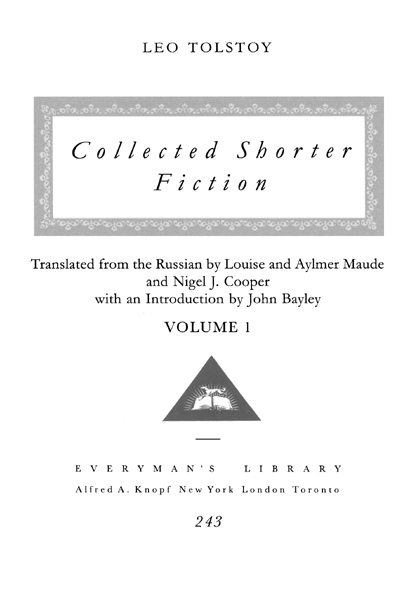LEO TOLSTOY
COLLECTED
SHORTER
FICTION
(in two volumes)

Written over a period of more than half a century, these stories reflect every aspect of Tolstoys art and personality. They cover his experiences as a soldier in the Caucasus, his married life, his passionate interest in the peasantry, his cult of truth and simplicity, and, above all, his growing preoccupation with religion. Ranging in scope from novellas like The Kreutzer Sonata and Hadji Murad to folk-tales only a few pages long, they provide a marvelous opportunity to become closely acquainted with Russias great novelist. Aylmer and Louise Maudes classic translations are supplemented by new translations by Nigel J. Cooper of six stories, including two that have never before appeared in English.
EVERYMANS LIBRARY
EVERYMAN,
I WILL GO WITH THEE,
AND BE THY GUIDE,
IN THY MOST NEED
TO GO BY THY SIDE
THIS IS A BORZOI BOOK
PUBLISHED BY ALFRED A. KNOPF
First included in Everymans Library, 2001
Introduction, Bibliography and Chronology Copyright 2001
by Everymans Library
Translations in the Appendix Copyright 2001 by Nigel J. Cooper
Typography by Peter B. Willberg
Fifth printing (US)
All rights reserved. Published in the United States by Alfred A. Knopf, a division of Random House, Inc., New York, and in Canada by Random House of Canada Limited, Toronto. Distributed by Random House, Inc., New York. Published in the United Kingdom by Everymans Library, Northburgh House, 10 Northburgh Street, London EC1V 0AT, and distributed by Random House (UK) Ltd.
US website: www.randomhouse.com/everymans
A CIP catalogue reference for this book is available from the British Library
Library of Congress Cataloging-in-Publication Data
Tolstoy, Leo, graf, 18281910.
[Short stories. English. Selections]
The collected shorter fiction/Leo Tolstoy; translated by Aylmer Maude and Nigel J. Cooper; with an introduction by John Bayley.
p. cm.
eISBN: 978-0-307-80665-9
1. Tolstoy, Leo, graf, 18281910Translations into English.
I. Maude, Aylmer, 18581938. II. Cooper, Nigel J. III. Title.
PG3366.A13 M3 2001 00-053487
891.733dc21
v3.1
CONTENTS OF VOLUME 1
INTRODUCTION
Tolstoy was not a particularly precocious young man, although from an early age he had vague ideas about becoming a writer. But he detested the artificiality and the hypocrisy which, as he felt, were an integral part of the way writers went about making things up. His ideal was an absolute simplicity and a straightforwardness which would describe people just as they were, and events exactly as they happened. Soon after he had written Childhood, Boyhood and Youth he came to dislike everything in it except the original childhood section. The later parts, he said, were an awkward mixture of fact and fiction, and it was the fictional element that repelled him.
Some time even before Childhood he had begun an experimental piece which he called A History of Yesterday. It is indeed just that; and as nothing much happened to Tolstoy on that particular yesterday it cannot be said to hold the readers attention very closely: indeed it is almost a refutation in itself of its authors view that if the writing is simple enough it is bound to be of interest to all. The story is of interest none the less, because of its startling affinity with fictional experiments, like those of Virginia Woolf, in our own century, although Tolstoys manner is too precise and too beady-eyed to give the impressionist effect so important to a sketch of hers like The Mark on the Wall.
Tolstoy greatly admired the first part of Dickens David Copperfield, which was appearing in the Russian periodical Sovremennik while he was meditating his own book. At least one touch in Dickens Davids curiosity about his own grief after his mothers death, and his pride in it before his schoolfellows may have suggested to Tolstoy his own kind of unremitting analysis of the same state of mind. But at times Childhood can remind us of the flatness of the History of Yesterday, although it has become an inspired kind of flatness.
At first I felt sorry for her, I wondered whether I ought not to try and console her, and how to do it: but finally I became vexed that she should place me in such an awkward situation.
Oh God, how absurd it is to keep on crying! I loved your mother so, we were such friends we and
She found her handkerchief, covered her face with it and continued to cry. My position was again an awkward one, and continued to be so for a good while. I felt vexed and yet sorry for her. Her tears seemed sincere, but I felt that she was not crying so much about my mother as because she herself was not happy now, and things had been much better in those days.
The bereaved boy is sorry for this old friend of his mothers as he has been sorry for himself, but Tolstoy goes on adding to the list of other considerations that come into question. The writing, though so simple, is wonderfully accurate, as Childhood itself is wonderful, but Tolstoy is still a very young writer who has not yet the strange power, which will take hold of him in the composition, on its epic scale, of War and Peace, of seeming both to comfort and to inspire the reader, even while he is insisting on a multitude of extraneous and sometimes tedious details. We see the remarkable shrewdness and truth of the narrators perception; but the scene also brings, as it has done in real life, a dull feeling of discouragement and discomfort. It is precisely because the thing is so like life that our interest droops and our curiosity seems futile, even impertinent. Tolstoy has not the knack in his stories, as Chekhov has, of raising what is random and hapless and inconsolable to the level of art. In order to understand people with love, and to present them so that they are understood in the same way by us, he needs a story on the scale of War and Peace, or Anna Karenina.
And yet Tolstoys stories, varied as they are, have their own brand of unique fascination. Some are long and on the scale of nouvelles, like The Cossacks, The Death of Ivan Ilych and Hadji Murad. Some are very short, like The Wood-Felling, from Tolstoys own army experiences, or his brief parables like God Sees the Truth, but Waits. All are distinguished by the same sense of a subject worked away on, made to reveal the utmost of itself that it can. And yet one could say that Tolstoy had a light touch. Turgenev, who admired his youthful tales, none the less displeased their author by telling him My dear Leo, you really shouldnt spend quite so long telling us the exact way the hero puts his hand in his pocket. An exaggeration, but a telling one. The stories do spend a disproportionate time going into such details. And yet so compulsive is Tolstoys method, and so penetrating and powerful the mind and observation at work, that he manages not to forfeit the readers attention for a second.


